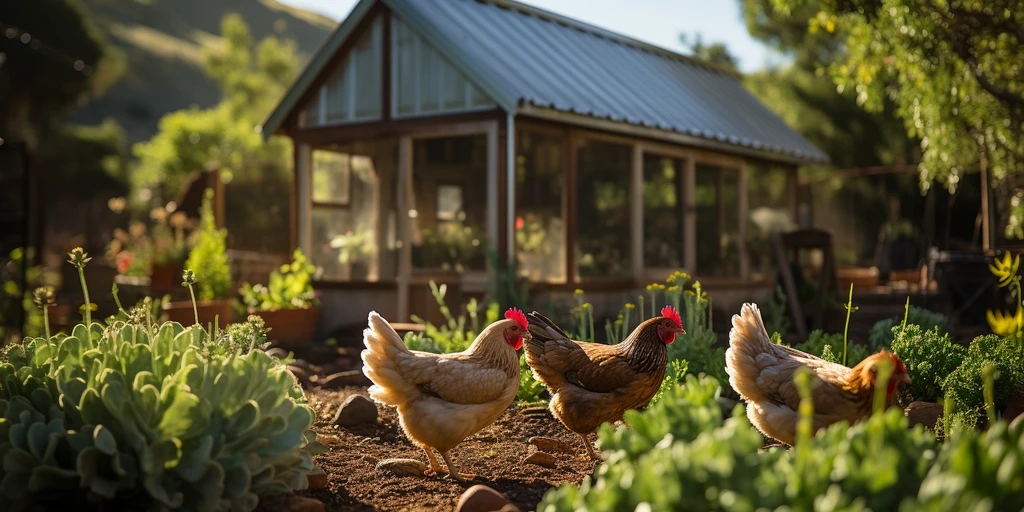Hen poultry farming is a profitable business venture that involves raising birds such as chickens, ducks, turkeys, and geese for meat and eggs. This form of animal husbandry can be done domestically or commercially, and it provides a reliable source of income for farmers. In this article, we will explore the basics of hen poultry farming and how to start a successful poultry farm as a beginner.

Credit: www.walmart.com

Credit: www.amazon.com
Why Start a Hen Poultry Farm?
Many people are attracted to hen poultry farming because it offers opportunities for additional income. Whether you sell your products at the farmer’s market or have a network of friends and neighbors who are willing to pay for your flock’s eggs and meat, chickens can be a great source of side income.
In addition to financial benefits, hen poultry farming allows you to have a sustainable food source. By raising your own chickens, you have control over their diet and living conditions, ensuring that you produce high-quality, organic eggs and meat.
Getting Started with Hen Poultry Farming
Before starting a hen poultry farm, there are a few key considerations to keep in mind:
1. Research And Planning
It is essential to conduct thorough research on hen poultry farming to understand the industry’s practices and requirements. This includes learning about different breeds, their specific needs, and the market demand for eggs and meat.
2. Acquire Suitable Land
Poultry farming requires adequate land for housing the birds, as well as space for feed storage and waste management. Ensure that the land you acquire is suitable for constructing coops, providing access to water, and allowing room for the birds to roam and graze.
3. Procure Quality Birds
Choose high-quality and disease-free birds for your poultry farm. Consider factors such as breed suitability, egg-laying capacity, and resistance to common diseases. It is advisable to purchase birds from reputable breeders or hatcheries.
4. Housing And Infrastructural Setup
Construct well-ventilated and secure coops that protect the birds from predators and extreme weather conditions. Install proper lighting, heating, and ventilation systems to provide a comfortable environment for the birds.
5. Feeding And Nutrition
Develop a balanced feeding program that meets the nutritional requirements of your birds. Provide them with a mix of grains, protein-rich feeds, and essential minerals and vitamins. Proper nutrition ensures healthy growth and optimum egg production.
6. Health And Disease Management
Regularly monitor the health of your flock and take prompt action against any signs of illness or disease. Consult with a veterinarian to develop a vaccination and deworming schedule. Maintaining clean coops and practicing good hygiene are crucial for disease prevention.
7. Egg Collection And Management
Collect eggs at least twice a day to maintain their quality and freshness. Clean and store them properly in a cool place. Keep track of the number of eggs produced by each hen for performance evaluation and future breeding selection.
Is Hen Poultry Farming Profitable?
Hen poultry farming can be a profitable business if managed efficiently. The profitability of your farm depends on various factors such as the market demand for eggs and meat, input costs, and production efficiency.
By implementing proper management practices, maximizing egg production, and reducing feed and other operational costs, you can improve your farm’s profitability. It is essential to stay updated on market trends, adapt to consumer preferences, and explore potential marketing channels.
Frequently Asked Questions For Hen Poultry Farming : Ultimate Guide
Are Hens Profitable?
Raising hens can be profitable, providing a supplemental income from selling eggs or poultry products.
How Do You Raise A Hen Farm?
To raise a hen farm, provide daily feeding and water, let them out in the morning and secure them at night, collect eggs twice a day, and clean the coop and pen weekly. This will maintain sanitation and odor control.
How Many Hens Do You Need For An Egg Farm?
For an egg farm, the number of hens needed depends on various factors like the size of the farm and desired egg production. Generally, a small-scale farm may start with around 50-100 hens, while larger operations could have several thousand.
It’s essential to find a balance between the cost of investment, space available, and egg demand to maximize profitability.
Do Chicken Farmers Make Money?
Chicken farmers can make money by selling eggs or meat from their flock. Many people start raising chickens as a side business, selling their products at farmers’ markets or to friends and neighbors. Taking care of chickens includes daily feeding and water changing, letting them out of the coop and putting them back in at night, and cleaning the coop and pen regularly.
By maintaining proper care and reaching out to potential customers, chicken farmers can earn a profit from their operations.
Conclusion
Hen poultry farming is a lucrative venture that offers opportunities for additional income and a sustainable food source. By following proper management practices and focusing on quality, you can create a successful and profitable poultry farm. Remember to prioritize the health and well-being of your flock and stay updated on industry developments to stay ahead of the competition.







